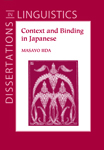

|
|
|
|

Context and Binding in JapaneseIn this book, Masayo Iida investigates the proper treatment of zibun-binding, reviewing the status of the syntactic subjecthood condition, She proposes a conjunctive theory of zibun-binding in which both a syntactic condition and a nonsyntactic condition apply to every instance of zibun-binding. This approach is contrasted with a disjunctive approach adopted in many theories of zibun-binding, which views the subjecthood condition as a fundemental licensing condition to account for nonsubject binding, when syntactic condition would be violated. Observing the fact that zibun-binding is affected by or interacts with various kinds of discourse information, and that the syntactic subjecthood condition does not impose its constraint independently, contrary to expectation, Iida claims that zibun-binding should be captured by a conjunctive theory, where the syntactic constraint minimally refers to a coargument relation between zibun and its antecedent, but not to subjecthood, while the discourse factor of zibun-binding is identified, inspired by previously proposed factors, which are all related and often presented under the general term “point of view”. The discourse notion of deictic perspective. The interpretation of so-called ‘zero-pronouns’ is also discussed. Like zibun-binding, zero pronoun binding is affected by a discourse factor, in this case attentional focus. The conjunctive approach in which a syntactic condition is minimally stated is also shown to be adequate in accounting for the interaction of syntax and discourse in zero pronoun binding The approach of this book is supported by the uncontroversial assumption that syntactic binding ought to be available whenever the syntactic condition is met. Iida concludes that it is more plausable to think of grammar as providing some definite constraints, and what discourse factors do is apply disjunctively or conjunctively with respect to those constraints. Violation of any constraint, syntactic or discourse-based, will lead to unacceptability which cannot be “repaired” by another component was a senior research scientist at Fujitsu Software Corporation at the time of this publication. Contents
10/1/95 ISBN (Paperback): 1881526747 (9781881526742)
Subject: Linguistics; Japanese Language--Anaphora; Japanese Language--Grammar |
Distributed by the
University of Chicago Press |
|
pubs @ csli.stanford.edu
|
CSLI Publications
Stanford University Cordura Hall 210 Panama Street Stanford, CA 94305-4101 (650) 723-1839 |